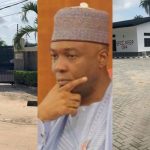The coronavirus has prompted almost two-thirds of American believers to feel that God is telling humanity to change how it lives, a new poll has found.
In the US, the virus has killed more than 80,000 Americans and caused economic hardship for millions, but the findings of the poll by the University of Chicago Divinity School and the Associated Press-NORC Center for Public Affairs Research indicate that people may also be searching for deeper meaning in the devastating outbreak.
‘You’re not alone. I am with you’: the chaplains tending to those dying from Covid-19
Read more
Even some who don’t affiliate with organized religion, such as Lance Dejesus of Dallastown, Pennsylvania, saw a possible bigger message in the virus.
“It could be a sign, like ‘hey, get your act together’ – I don’t know,” said Dejesus, 52, who said he believes in God but doesn’t consider himself religious. “It just seems like everything was going in an OK direction and all of a sudden you get this coronavirus thing that happens pops out of nowhere.”
The poll found that 31% of Americans who believe in God feel strongly that the virus is a sign telling humanity to change, with the same number feeling that somewhat. Evangelical Protestants are more likely than others to believe that strongly, at 43%, compared with 28% of Catholics and mainline Protestants.
In addition, black Americans were more likely than those of other racial backgrounds to say they feel the virus is a sign God wants humanity to change, regardless of education, income or gender. Forty-seven per cent say they feel that strongly, compared with 37% of Latino and 27% of white Americans.
Covid-19 has disproportionately affected black Americans, exposing societal inequality that has left minorities more vulnerable and heightening concern that the risks they face are getting ignored by a push to reopen the US economy. The poll found black Americans who believe in God are more likely than others to say they have felt doubt about God’s existence as a result of the virus – 27% said that, compared with 13% of Latinos and 11% of white Americans.
But the virus has prompted a negligible change in Americans’ overall belief in God, with 2% saying they believe in God today, but did not before. Fewer than 1% say they do not believe in God today but did before.
Most houses of worship stopped in-person services to help protect public health as the virus began spreading, with religious Americans turning to online and drive-in gatherings to express their faiths. Americans with a religious affiliation are regularly engaging in private prayer during the pandemic, with 57% saying they do so at least weekly since March – about the same share that say they prayed as regularly last year.
Overall, 82% of Americans say they believe in God, and 26% of Americans say their sense of faith or spirituality has grown stronger as a result of the outbreak. Just 1% say it has weakened.
Kathryn Lofton, a professor of religious studies at Yale University, interpreted the high number of Americans perceiving the virus as a message from God about change as an expression of “fear that if we don’t change, this misery will continue”.
“When people get asked about God, they often interpret it immediately as power,” said Lofton. “And they answer the question saying, ‘Here’s where the power is to change the thing I experience.’”
Fifty-five per cent of American believers say they feel at least somewhat that God will protect them from being infected.
Evangelical Protestants are more likely than those of other religious backgrounds to say they believe that, with 43% saying so strongly and another 30% saying so somewhat, while Catholics and mainline Protestants are more closely split on feeling that way or not.will no longer be a part of Bravo’s reality series “Vanderpump Rules” after calling the cops on their Black co-star two years ago.
Bravo a






Comments are closed.